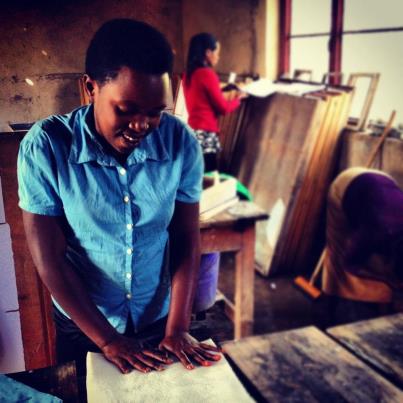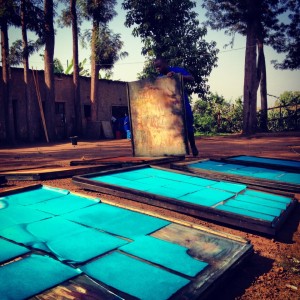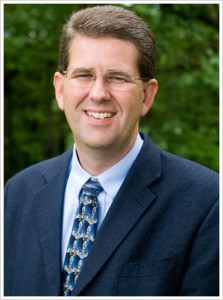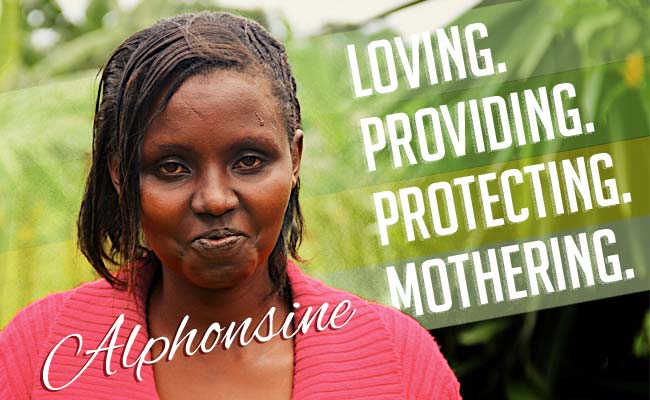It was her five children who first motivated Alphonsine Kimuzaza to join “Peaceful,” a community bank an hour outside Kigali, Rwanda, in 2009. They needed books, uniforms, and supplies for school, as well as healthy food to eat—but Alphonsine says she felt “like a parasite” approaching her husband day after day with a list of needs she knew he couldn’t afford to meet with his income as a driver. But she’s quick to add that things have changed: “Now I contribute. … We’ve joined together to make something big.”
Alphonsine identifies a loan of $167 from HOPE’s partner Urwego Opportunity Bank as “the spark.” It enabled her to purchase plantains and other food stuffs for resale, and the business has prospered. Alphonsine has become a wholesaler, selling up to eight tons of beans and sorghum a week while maintaining her plantain sales. Her income varies, but she earns over $50 a day. She’s purchased a hybrid cow that produces more than two gallons of milk a day, and after her children have had their fill, she sells the remainder. Her income helps pay for all five of her children to attend school.
When she learned that three young relatives of her husband had been orphaned, she had sufficient resources to open not only her heart but her home to the children, adopting them, sending them to school, and meeting all of their needs.
“The fact that I have a successful business is not just my hard work. It’s God who led me to the right business,” she says. But Alphonsine is working hard to achieve her dream, and she has eight powerful motivators. “I want my children to go to university,” she says. “That’s the reason I have to work so hard.”
It’s the hard work of our clients and the transformative love of God that changes lives—but a small loan can be “the spark.” Spark change today in honor of a woman you love.
An Essential Alliance
HOPE’s president, Peter Greer, recently addressed the Christian Alliance for Orphans’ annual Summit at Saddleback Church on the topic “Microfinance and Orphan Care: An Essential Alliance.” Having witnessed how clients like Alphonsine open their homes to orphans, we see microfinance as a powerful, local solution to the orphan crisis with the potential to positively impact thousands of orphaned children around the world—by keeping at-risk families together, by providing a livelihood for orphans as they enter adulthood, and by enabling families to take in those who are orphaned within their own communities. To read an interview with Peter Greer on the intersection of microfinance and orphan care, see this blog post.
Just in time for Mother’s Day comes the release of Mommy’s Heart Went POP!, a children’s book co-authored by Peter Greer detailing his family’s personal journey with international adoption and providing a resource for other families. For more information or to order your copy, visit http://www.pop-theadoptionbook.com.
 A Rwandan artisan turns recycled paper into designer greeting cards via Cards from Africa. HOPE introduced savings groups to the vibrant young staff—all orphans—of this organization.
A Rwandan artisan turns recycled paper into designer greeting cards via Cards from Africa. HOPE introduced savings groups to the vibrant young staff—all orphans—of this organization. Cards from Africa. After the recycled paper is blended into a pulp, it is dyed and dried under the Rwandan sun.
Cards from Africa. After the recycled paper is blended into a pulp, it is dyed and dried under the Rwandan sun.






 In the Lancaster, PA, area? Join HOPE International and Community Fellowship Church this Wednesday, June 20, at 7 p.m. for “When Helping Hurts,” a free live webinar with Dr. Brian Fikkert, executive director of the Chalmers Center for Economic Development and co-author of When Helping Hurts: How to Alleviate Poverty Without Hurting the Poor … and Yourself.
In the Lancaster, PA, area? Join HOPE International and Community Fellowship Church this Wednesday, June 20, at 7 p.m. for “When Helping Hurts,” a free live webinar with Dr. Brian Fikkert, executive director of the Chalmers Center for Economic Development and co-author of When Helping Hurts: How to Alleviate Poverty Without Hurting the Poor … and Yourself.








